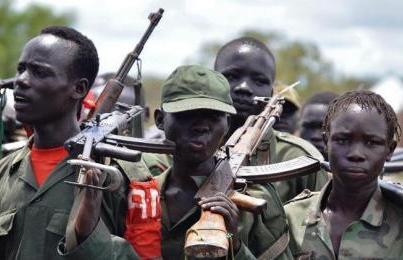South Sudan cobra faction releases 250 more children
March 23, 2015 (WAU) – The United Nations International Emergency Children’s Fund (UNICEF) in South Sudan said 250 more child soldiers including four young girls who were serving with armed forces under South Sudan’s Cobra Faction in Jonglei state have been released on Saturday.

“This is the third release of children who were serving under the Cobra Faction as child soldiers since the signing of peace deal with government,” said Veith.
Cobra Faction was previously a rebel group led by David Yau Yau that fought for greater autonomy of Pibor county from the rest of Jonglei state. The group last year signed a peace agreement with the government which created an autonomous Pibor county administration for the predominantly ethnic Murle.
The group was accused of recruiting hundreds or thousands of underage children to fight in its rank and file since 2010 when they took up arms against the government.
The first group of 600 children was however released last month in Pibor and Gumruk counties, said the UNICEF official, adding that release of another group of 400 children may take place in the next few days.
In a similar development, reports from UNICEF also said 89 underage boys were also abducted in Wau Shilluk area within the Upper Nile state’s capital, Malakal, last month by another pro-government local militia group led by Gen Olony.
The news broke last month when UNICEF issued a release with a strong condemnation of the incident and called for their immediate release as it also condemned the practice by various South Sudanese warring parties across the board.
“The recruitment and use of children by armed forces destroys families and communities,” lamented UNICEF’s official to the country.
“Children are exposed to incomprehensible levels of violence; they lose their families and their chance to go to school.”
In late January, the United Nations announced it had secured the release of around 3,000 child soldiers in South Sudan from pro-government and rebel forces.
Jeffrey Gettleman of The New York Times reported that many of the initial 280 children released were not new recruits by had been a part of militias for years and never went to school.
UNICEF has been brokering deals with the factional groups and is helping to return the children to their families, although there are concerns that the release does not mean groups are stopping the practice of using child soldiers.
The nearly 15-month old South Sudan conflict which started as political differences within the ruling SPLM party between factions led by president Salva Kiir and his former vice president Riek Machar, has now left tens of thousands of people dead.
Some 1.5 million people are displaced from their homes in South Sudan and more than 100,000 have fled to neighbouring countries of Sudan, Ethiopia, Kenya and Uganda. Estimated 2.5 million people face “emergency levels of food insecurity,” as the World Food Programme (WFP) also warns of food shortage to feed South Sudanese refugees on daily basis in the neighbouring countries.
Talks to restore peace in the country broke down on 6 March but are expected to resume in April in Addis Ababa to try to end the crisis amidst growing impatience from the international community.
(ST)
